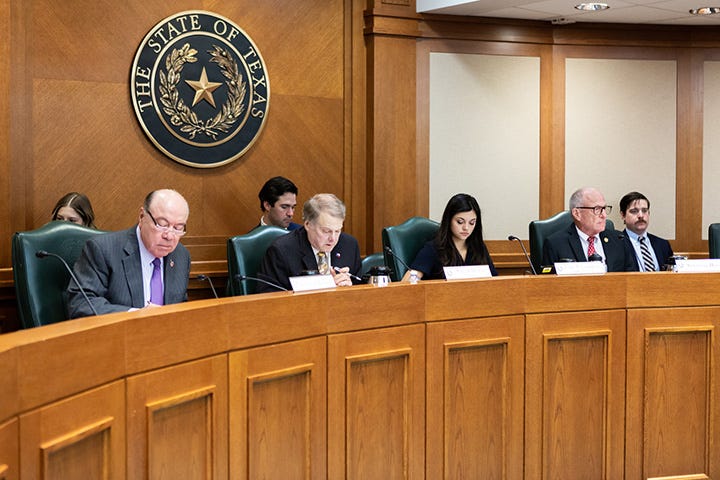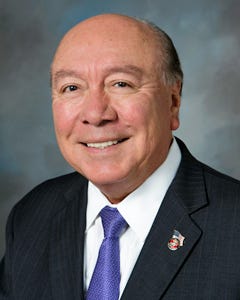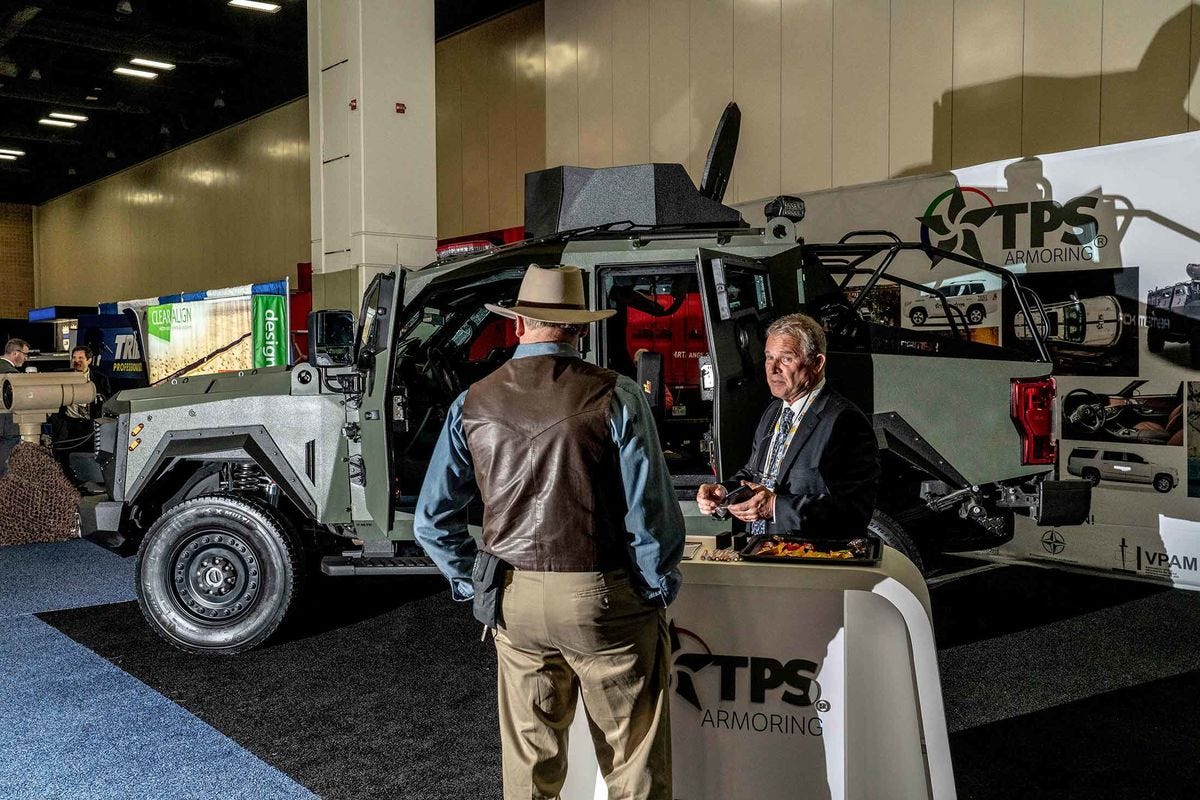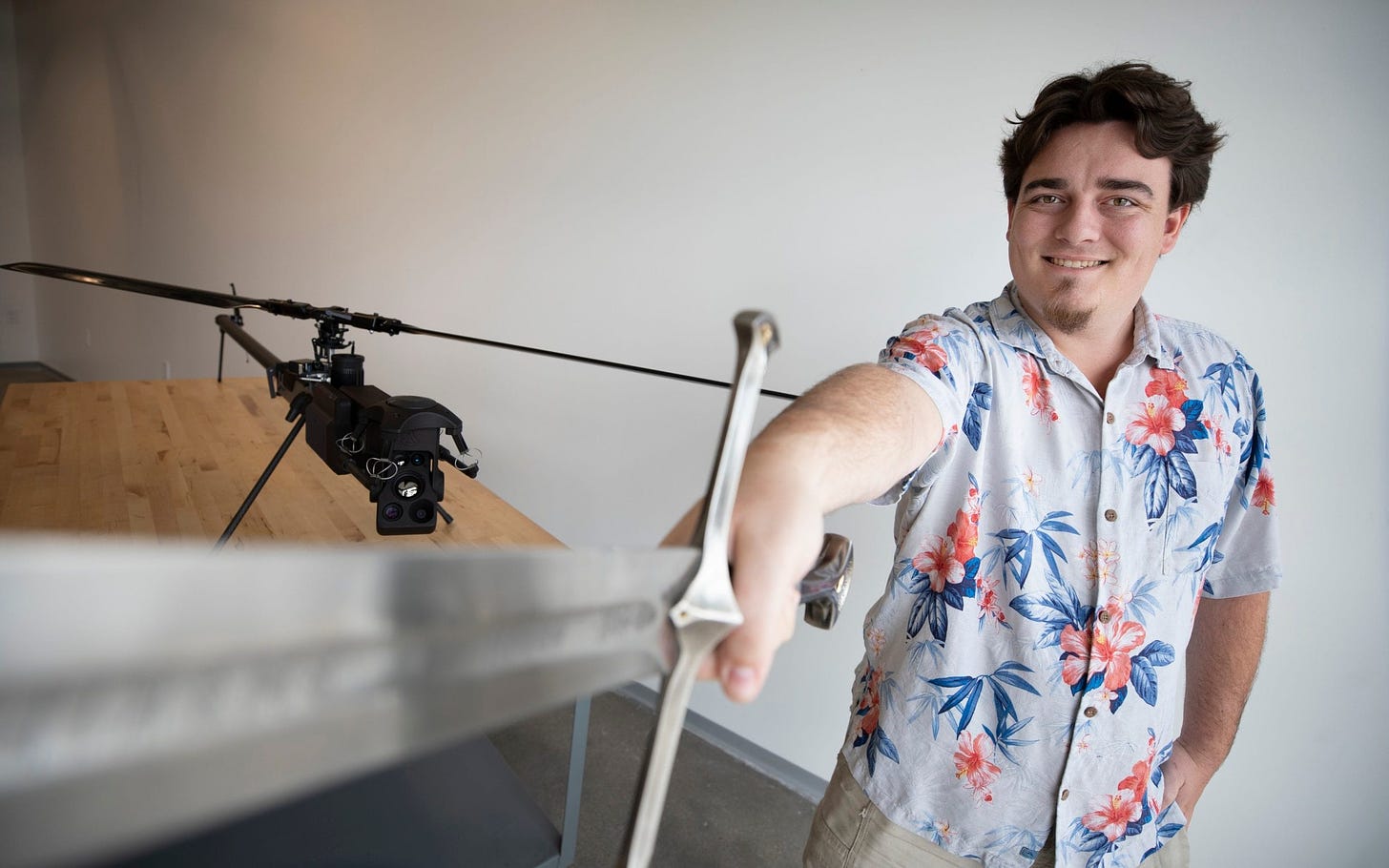Border Security Committee Hearing
And Secret DHS Documents Forecasting Grim Future Without Title 42
Hello again friends,
A quick heads up, this newsletter may be too long for email. If it cuts off awkwardly, look for the whole thing on our website.
A lot to share with you this morning, after spending yesterday afternoon watching a Texas State Senate Border Security Committee Hearing. Let’s say right up front— the thing was brutally boring. You might say we watched it so you don’t have to.
A sacrificial lamb to the slaughter of oversight.
One major take-away from watching the thing, is a feeling as though some state lawmakers in Austin have only a slight familiarity with the nuts and bolts of Operation Lone Star, going over very very old and retreaded ground about how the magistration process works once illegal aliens are arrested for trespassing. There was also a strange feeling as though lawmakers are about 3-6 months behind on what’s happening on the border.
There are several vague and remote possibilities as to why such a distant remove might be beneficial, but for a watcher familiar with the issues and happenings it can be very difficult to ponder the fact that these are the guys who are making the decisions on what may be the biggest issue facing the state for the next decade, and they can’t hardly bother to apprehend an up-to-date familiarity with any of it. Maybe an out-of-touch seeming hearing is one of the ways they get that familiarity, but the mission didn’t seem accomplished this day. However, it’s possible we could be unfairly biased in the matter. And they may be more familiar with things than we realize.
Or, they might just be too busy with their local districts and concerns.
Let’s pretend some of these fine folks on the Committee might actually read this, and present for them a basic 101 on how Operation Lone Star is supposed to work.
Imagine you are a 35 year old illegal alien with prior convictions in the United States for drunk driving, named Pedro. You’re not the worst man in the world, but you know there’s no chance in hell you’re going to qualify for asylum, or be allowed to stay in the US, after being caught on the streets of Houston in a prior visit, blind drunk and driving. You’re going to have to cross and avoid border patrol. No quick surrender for you.
You’re also familiar with the area around Ciudad Acuña, and you know the Cartel will allow you to cross there without paying extra for the privilege. Other spots, you might risk a beating or worse for trying to cross without paying. So you go there. Maybe you pay a Coyote for hopefully up-to-date guidance and make the trip with a group for what small safety and support that comes of that.
Once across the river, you plan to hike your way up and out of the old Bill Moody ranch in Kinney County. It’s a deserted stretch of the river, mostly— not as closely watched as some others, because there’s so much walking involved. It’s just never been *that* popular with illegal aliens and not a high priority for the U.S. Border Patrol.
This time, however, cameras and other sensors deployed by a DPS Brush Team detect the entire group. You have no way of knowing— the cameras are camouflaged. The first clue is a norteamericano accent singing out from the black, telling you and your group to freeze, paired with blinding lamps from all directions. Strange men in military-seeming uniforms, some pointing guns, others pointing fingers, most equipped with some kind of thermal or low-light optics are herding you all up against a fence— there’s nowhere to run with the river at your backs and uncertainty everywhere else.
It might take an hour or two for unmarked vans to arrive, hauling you and the rest to a processing center. Single men stay in State Custody— women, children and family units are separated and turned over to the U.S. Border Patrol. You have no way of knowing for sure, but odds are decent they’ll be back in Mexico in no more than 2 or 3 days. Some will try and make the trip again almost immediately, hoping this time their luck will be better. There’s 16 miles of river in Kinney County alone— surely it can’t all be watched.
That’s no help for you, however— you wind up taking a very long 30 or 40 minute ride to Val Verde County, where authorities deposit you at a tent-and-chain-link processing center. It’s air conditioned. Maybe too cold at first. If you’re lucky, someone will explain what’s happening. All you know is that there’s no U.S. Border Patrol anywhere. It’s all Sheriff’s Deputies, DPS and others you don’t recognize. In 12 hours or less, each single adult male will appear before a Magistrate— legal paperwork will begin attaching to your case, on the basis of any prepared affidavits from land owners in Kinney County wanting to prosecute illegal aliens for trespassing. You will also be assigned a defense attorney.
The processing center should have two sets of bulk magistration hearings a day, and two sets of vans and busses will make the journey to the Dolph Briscoe Unit in Dilley, where illegal aliens are being held on trespassing charges. Occasionally, depending on overflow, some will be held at the Segovia Unit in the Rio Grande Valley.
Once in Dilley, you’ll eventually be party to the next steps in the legal process. Depending on your assigned attorney, you might be able to meet with them in person— or you might have to settle for an internet teleconference with them, where various legal options can be discussed. If you’re lucky, you might be able to arrange someone to pay bail and get you out of the lockup before any further hearings.
One interesting factoid to come out of the senate committee hearing came some time after the 1 & 1/2 hour mark, when Border Prosecution Unit Attorney Nelson Barnes testified that roughly 45% of those arrested in Kinney County have made bond.
What we’ve described so far is in fact an idealized account of what someone caught on a ranch tomorrow by the State of Texas might expect to happen. It represents roughly 1-year’s worth of effort and some mistakes along the way, to establish a system and set of procedures in a process that some critics would say has been plagued with missteps leading to some cases where illegal aliens have been locked up for weeks and months without meeting their defense attorneys or a hearing.
We frequently link to coverage of the border crisis by the Texas Tribune’s Jolie McCullough— she tends to have the most thorough and up-to-date coverage of the criticisms of Operation Lone Star.
You can find her latest here: https://www.texastribune.org/2022/04/04/texas-border-operation-imprisons-thousands-accused-only-of-trespassing/
It is a lengthy piece, and a pretty solid summary of things to date, though it omits something we’ll be reviewing shortly, in light of some criticism that was levied during the hearing, and partly where we are basing our concerns about how out-of-touch lawmakers seemed to be. That’s not a criticism of her story— which has a lot of other ground to cover, and covers it handily.
However, one thing that did come out of the hearing, was a mea culpa by the state, essentially saying they were not ready for the volume of arrests initially generated by Sheriff’s Deputies and DPS Troopers in Kinney County, and that most of the difficulties that do remain are almost directly attributable to that initial backlog.
It was in the course of examining this backlog that some criticism of the County seemed to be levied, by State Senator Juan “Chuy” Hinojosa from McAllen— who seemed to have taken issue with the recent dismissal of 3 appointed judges some months back, and their replacement with a rotating slate of County Judges.
Senator Hinojosa, apparently unfamiliar with the process that saw those original judges put into place, seemed to feel Kinney County overstepped its bounds in dismissing and replacing them. The senator has a juris-doctorate from Georgetown law school, but the Texas Criminal Court of Appeals has already disagreed with him and others holding his position, upholding the decision made by Kinney County Judge Tully Shahan to dismiss and replace the judges.
See our previous coverage of that, here:
Since publishing that piece, we’ve become aware of the fact that at least two of those state-appointed judges are also seated on the board of the Texas Indigent Defense Commission, which among other things has been steering millions of dollars to Texas Rio Grande Legal Aid and the Lubbock Private Defenders office, to provide defense attorneys for Operation Lone Star.
Maybe we’re crazy, but it seems like that could be construed as a small conflict of interest. In any event, the point is moot now— since those judges have been dumped and replaced. Let’s be clear— the money does need to be spent, establishing a defense for broke and relatively penniless illegal aliens— and those two organizations would seem to be natural choices for the work they do. However— if you believe that “Caesar’s wife must be above suspicion,” and many do, then it would follow that those judges on the board of the TIDC should’ve never been involved in hearing cases.
It’s not clear if Senator Hinojosa is aware of this background— or the fact that the head of the Lubbock Private Defender’s Office is the subject of an ethics complaint with the state bar, after allegations that he was pressuring his attorneys to go against their clients wishes— wanting them kept in lockup as a way to somehow clog up and jam Operation Lone Star.
See our past coverage of that, here:
Since the publication of this story, we’re told that Philip Wischkaemper, the head of the LPDO, is no longer actively in charge of assigning and coordinating with Operation Lone Star attorneys— the task is apparently now in the hands of an assistant, who we are told has directed her attorneys that they “shall not” have contact with any reporters. Whatever. They’ll talk to reporters if they feel the need to, regardless of such grade-school type finger wagging.
We are also told that the ethics complaint against Wischkaemper is moving along in the process at the State Bar, though it will be some time yet before there’s any kind of a hearing.
Given the general lack of any truly in-depth news coverage of the border crisis in mainstream sources, it is perhaps unsurprising that a State Senator would seem to know nothing of these matters and go shooting off about how a County should be unable to dump seemingly unacceptably performing judges.
We are perhaps being a little too critical of Sen. Hinojosa. Given his age, and being from McAllen, he almost certainly has a broad awareness of many other border issues that we know nothing of.
Have you seen former Sector Chief-turned-reporter Randy Clark’s latest report?
He’s digging in to what the future holds when Title-42 expires, accessing secret, unreleased documents that DHS probably doesn’t want him to have.
We note, in the Senate hearing we mentioned previously, lawmakers were a little mixed up— constantly referring to “Section-42.”
Title-42 is described by at least one civil-rights organization as “the code that addresses public health, social welfare, and civil rights.” Paired with the Covid-19 health crisis, it’s been used as a way to turn back large numbers of illegal aliens.
But, it is now dead in the water, with the White House announcing plans to dump it.
So— let’s get this straight: The White House says you still need to wear a mask to get on a plane. And the City of New York says toddlers should still be masked.
But folks crossing the border illegally are just fine— mask or no.
Weird.
Getting back to Randy Clark’s piece, the main takeaway there, is that DHS is predicting a very grim future on the border involving “record and unprecedented numbers” responding to news that Title-42 is going away, and doesn’t really have much of a plan for how to handle it, except for us all to just “Lie back, close our eyes, and think of England.”

We don’t choose that phrase lightly. It’s a euphemism for rape.
The “Southwest Border Mass Irregular Migration Contingency Plan” is what it’s called. You can read the whole thing for yourself. Breitbart has it up as a downloadable pdf.
One thing we mentioned to you some weeks back, was reporting indicating how visa changes in Nicaragua are helping feed a mass migration of Cubans to the southern border.
It was originally reported by our associate at Citizen Stringer, an independent journalist named Lauren Jessop who first made the link, and later expanded on it here, calling it “weaponized migration.” Jessop shows a talent for a nice turn of phrase, routinely publishing round ups of what she calls the “Disorder at the Border.”
Well, she’s no longer the only one to connect the dots between Cuba and Nicaragua. Perennial favorite here at the Dispatch, Todd Bensman, has also picked up the thread— calling it a “silent Mariel boatlift” in his latest, which also touches upon the expiration of Title 42.
The Mariel boatlift was a particularly notable incident in U.S. & Cuban relations, when Fidel Castro emptied out Cuba’s prisons, dumped everyone on a boat, and shipped them to Florida.
Some were political prisoners— men and women of conscience who were out-of-step with Communism.
Others were just rapists and murderers.
The opening scenes of the Al Pacino movie “Scarface” depict the boatlift.
Last week in San Antonio saw the “Border Security Expo,” basically a trade show and panel for law enforcement and contractors and vendors trying to sell them gadgets and tools for policing the border.
In the words of the progressive “Border Chronicles” substack, it had robo-dogs, protestors, and Palmer Luckey too.
Palmer Luckey is the inventor and tinkerer perhaps most responsible for recent advances in virtual technology— closely associated with the Oculus Rift headset, now owned by Facebook. He’s almost a celebrity, now in charge of a company called “Anduril,” which takes its name from a magic sword in the Lord of the Rings, also called “The Flame of the West.”
Many believe Tolkien was speaking to the classical hellenistic heritage of democratic thought that he characterized as “The West,” versus the Persians representing dictatorship and despotism as “The East,” during the Battle of Thermopylae.
Palmer Luckey and Anduril are marketing what they call an autonomous drone.
The “Border Chronicles” is the sort of publication that many in favor of policing the border will vehemently disagree with— it frequently calls for what sounds to some like “open” borders, and “open” immigration.
But, one anecdote highlighted by reporter and author Todd Miller, concerns one private citizen in attendance, and is well worth sharing more widely:
There are bright lights on the panel, where five men sit, including former Customs and Border Protection commissioner Robert Bonner and former acting director of Immigration and Customs Enforcement Thomas Homan. It is dark in the audience, so it is difficult to see the man when he begins his question. He says he’s from South Texas, the Rio Grande Valley. He says his son is in the Border Patrol. He repeats a point that the panelists had made earlier, that cartels are making a lot of money on the other side of the border. But, he says, the expo floor here is filled with companies, so there are evidently a lot people making money on this side of the border too.
“Why,” he asked, “would you even want a solution?” There is an audible hush in the audience and a prolonged silence among the panelists, many who themselves have gone through the DHS revolving door and now work for private companies (including Homan and Bonner). The pause goes on for so long that the man has to step forward to the microphone again and ask, “Would someone be able to address that question?”
—The Border Chronicles Substack, Todd Miller
That’s a pretty good question. One that people probably want to take a few minutes to think about being able to answer if and when it comes up again, because it will.
Why secure the border, when managing it pays better for certain vested interests?
Keep that proposition in the back of your minds, friends, in the weeks, months, and years ahead as we ponder certain actions taken and not taken in Washington and Austin both.
We’re almost ready to call it a newsletter, just one more item left.
Here’s a recent photo passed on to us by a new subscriber, taken by a friend— depicting what he calls “La Torre de los Zopilotes,” or “The Tower of the Buzzards.”
This is a tower recently put together in Zapata County, near the Border Patrol station there. As you can see, it’s a very popular spot for the local airborne scavenger, roosting there as night approaches.
Towers like these are routinely used along the border to set up relays and cameras— bouncing signals to and from remote locations where cell coverage and other tech-options are in short supply. It’s an element of a sort of “panopticon” strategy of monitoring the border that’s been in vogue recently. In the Rio Grande Valley, Border Patrol frequently makes use of aerostatic blimps and other tools in addition to drones, making for a nearly 24/7 monitoring and surveillance of surrounding areas.
Interestingly, we found a recent article quoting U.S. Rep. Henry Cuellar, saying that the blimps are going to be retired soon, because they’re so expensive. For now, they remain in place.
If you didn’t click the link earlier, the “Panopticon” is a reference to an 18th Century theory about a system of control and monitoring, highlighted by the fact that those being monitored don’t know exactly when they’re being watched— only the possibility that it could be happening at any time.
If it sounds a little spooky, that’s because it is.
In any event, getting back to the Tower of Buzzards— Border Patrol is probably going to have to figure out some way to discourage the birds. Buzzard droppings are apparently highly corrosive and likely to cause expensive long-term damage to the tower if nothing is done.
And it is on that note that we call it a day. We hope to be back with more later this week, but if we aren’t— have a great one.
The Mesquite trees are showing green leaves here in Kinney County. We’re reminded of now long-deceased school teacher and Kinney County resident Else Sauer’s wisdom: “You know the cold weather’s over when the mesquite turns green.” So get ready for warmer temperatures here, there, and everywhere.
Ms. Sauer was about 90 something years old when we knew her. She’s widely remembered as perhaps the one most responsible for establishing a public library in Kinney County. She once told us she knew it was time to stop teaching when they told her she couldn’t put troublemakers under her desk where she could kick them for acting up.
True story. Once found a guy who was under that desk. He does HVAC in Uvalde now. Good guy.
As always, this newsletter is produced independently of our day job at the Kinney County Sheriff’s Office, and is issued without the input or oversight of others. Any errors and opinions within are ours alone.
We’ll see you soon.










I agree with Ms. Else - been my rule since living here
Great article as usual. Enjoy your writing style. Enjoy reading between the lines.